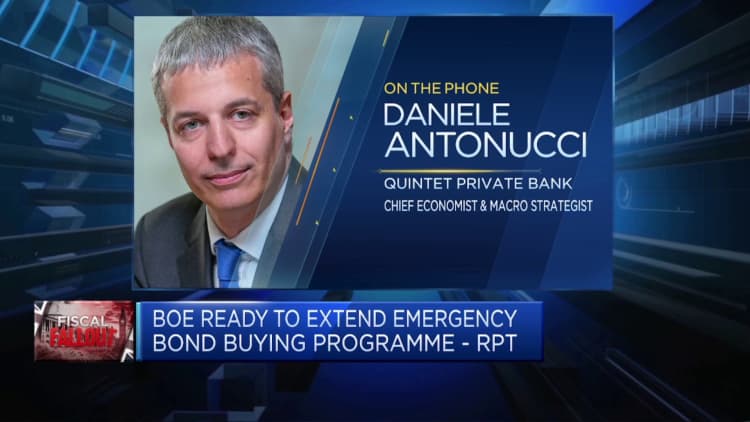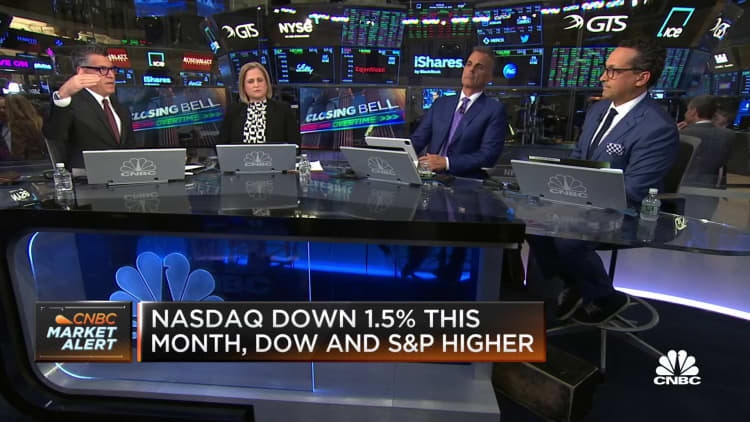The British pound whipsawed on Wednesday morning amid mixed messages about the end of the Bank of England's emergency bond-buying package.
Speaking at an event organized by the Institute of International Finance in Washington, D.C., late Tuesday, Bank of England Governor Andrew Bailey said that "part of the essence, I think, of a financial stability intervention is that it is clearly temporary."
Bailey's comments on Tuesday initially sent sterling lower, but the pound rebounded early on Wednesday following a Financial Times report that said the Bank of England is privately signaling a willingness to extend its emergency bond-buying program.
The report, which cited anonymous sources, came on the heels of the comments by Bailey who confirmed that the central bank would end its rescue program on Friday as planned.

The pound fell as low as $1.0922 in Asia's morning trade before popping to $1.106 after the FT report was published. It then gave back most of its gains during early trade in London, before climbing again to around $1.103 by mid-morning.
"As the Bank has made clear from the outset, its temporary and targeted purchases of gilts will end on 14 October," a Bank of England spokesperson reiterated on Wednesday.
"The Governor confirmed this position yesterday, and it has been made absolutely clear in contact with the banks at senior levels. Beyond 14 October, a number of facilities, including the new TECRF, are in place to ease liquidity pressures on LDIs."
Loading chart...
The U.K. government announced a radical economic plan, a so-called mini-budget which included unfunded tax cuts, on Sept. 23. The move sent financial markets into a tailspin, as investors sold off the pound and ditched U.K. bonds.
In a bid to stem the sell-off, the BOE in late September said it would delay its plan to sell U.K. government bonds and buy long-dated bonds for two weeks as part of emergency measures to calm the market.
Several pension funds were hours away from a collapse when the BOE stepped in, Deputy Governor Jon Cunliffe wrote in a letter to a lawmaker last week.
Since then, the central bank has expanded its rescue package twice, and the authorities made a policy U-turn — scrapping a plan to cut taxes for the highest earners.
Calls for extension
The Pensions and Lifetime Savings Association called for an extension to the BOE's intervention, which is due to end on Oct. 14.
"A key concern of pension funds since the Bank of England's intervention has been that the period of purchasing should not be ended too soon, for example, many feel it should be extended to the next fiscal event on 31 October and possibly beyond," the PLSA said in a statement Tuesday.
If bond purchasing is stopped, "additional measures should be put in place to manage market volatility," it added.

But Bailey said late Tuesday that the BOE does not intend to continue buying bonds to stabilize the market.
"We have announced that we will be out by the end of this week. We think the rebalancing must be done," he said.
"And my message to the funds involved and all the firms involved managing those funds: You've got three days left now. You've got to get this done."
Daniele Antonucci, chief economist and macro strategist at Quintet Private Bank, told CNBC on Wednesday that since the driver of market volatility was fiscal policy rather than the Bank of England, there was only so much the central bank could do to soothe the currency and bond markets.
"It's fiscal policy, it's the instability that it has created in the market — you look at the pensions sector, you look at the mortgage market as well — and the Bank understandably is trying to fulfill its mandate for financial stability," Antonucci said.
"I suspect it's going to be a few weeks of volatility and uncertainty in the marketplace. The next catalyst, basically, what could stabilize the situation or not, is the full budget with the OBR forecast alongside it."

British Finance Minister Kwasi Kwarteng announced on Monday that the government's full fiscal plan, and accompanying forecasts from the independent Office for Budget Responsibility, would be brought forward by three weeks to Oct. 31.
This is the same day that the Bank of England had earmarked to start selling its gilt holdings, as part of its quantitative tightening cycle and unwinding of pandemic-era monetary stimulus.
— CNBC's Jenni Reid contributed to this report.


